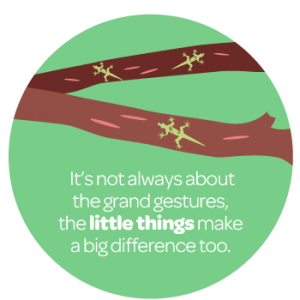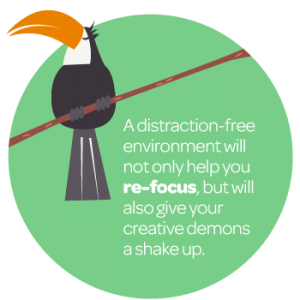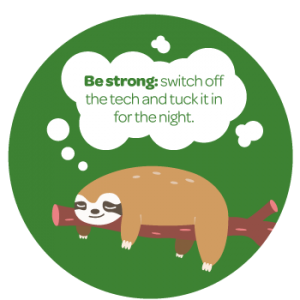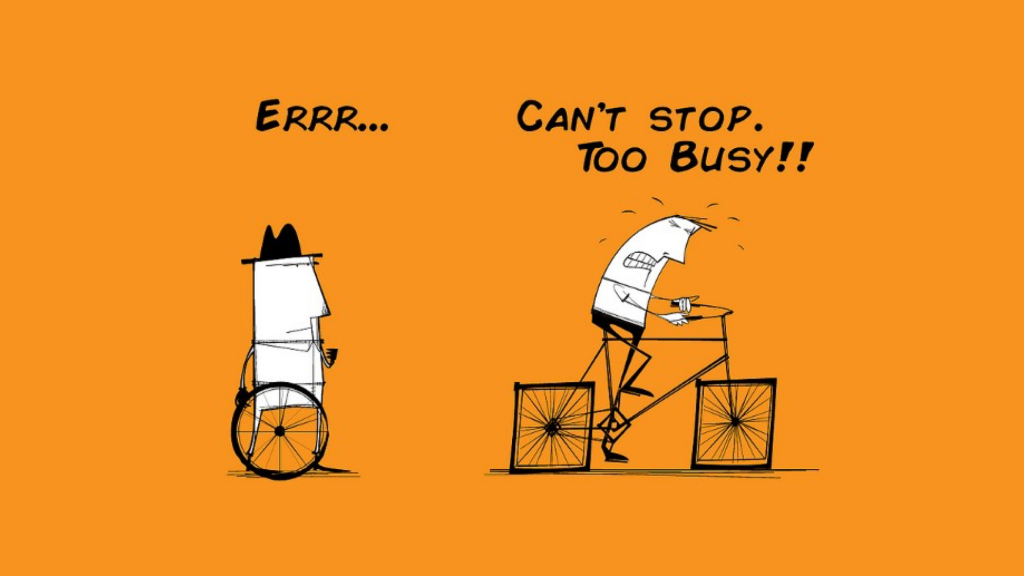Think about the last time someone asked about your day.
On a scale of 1 to 10, how highly did the word ‘busy’ feature?
A strong 12 out of 10? Was it the sole focus of your response?
And when you said ‘busy’, did you wince internally, knowing it’s your ‘go-to’ answer? The point is this: as employees, we’re always on fast-forward. The perceived idea of happiness and fulfilment gained from being constantly busy is overwhelming at best; unsustainable and depressing at worst.
Sounds dramatic? Every time you cram something new into your schedule, you’re denying yourself the opportunity to focus on the task at hand. Every time you rush through a project without giving it thought and structure, your creativity is suffering a creeping death.
Perhaps ‘creeping death’ is a notch too far on the drama-geddon scale, but the effects of being continuously busy?
A hugely negative impact on your creativity and wellbeing.
- So what can you do to make a change?
- To eke out some well-needed and deserved time?
We’re not going to tell you to just fit creativity in because that’s unrealistic. We’re giving you a few suggestions that will encourage some changes in your daily schedule…
Worry about the big things to do first
On one hand, you’ve got your big things to manage – campaigns, events, projects, strategy planning, etc. On the other, there’s the little things – the gazillions of emails and updates that require your attention every day. Check out this nifty trick by Mike James that will help you to prioritise the big things and comfortably fit the little thingsin too.
Make little changes
When you’re busy, big changes in the way you work can only add to the pressure. Small tweaks are often better. So unsubscribe form those emails you don’t read, decide if you really need to go to that meeting, park a little farther away from work to make time for a 10 minute walk…
It’s not always about the grand gestures, the little things make a big difference too.
Channel your inner tortoise
Not by hiding in your shell, but by managing tasks more slowly. Separate the urgent from the important and prioritise accordingly.
A little time invested here will allow you to focus on tasks more slowly and more meaningfully, leaving your head less crammed. Slow and steady – as any tortoise knows – wins the race.
Straight outta the office
There are so many distractions in the workplace it’s hard to know which way is up. So if you can work offsite – even just for a few hours – do it. A distraction-free environment will not only help you re-focus, but will also give your creative demons a shake up.
Cultivate the art of ‘deep work’
In his book, Deep Work, Cal Newport describes the skill of achieving more in less time and learning to focus without distraction on a cognitively demanding task. Newport claims that most people have lost the ability to go deep — spending their days instead in a frantic blur of busyness. He encourages us to allocate sustained chunks of time for concentrating on the difficult things that provide the most value.
Quit social media
Let’s face it, social media is designed to be addictive and research tells us that when we spend large portions of our day in a state of fragmented attention it will permanently reduce our capacity for concentration. When you consider that every distraction takes 20-25 minutes to recover from you can start to understand the damaging impact of those Facebook / LinkedIn / Twitter / Instagram notifications…
…and the second word is ‘off’…
It’s not only social media that provides a constant source of distraction in our already busy lives. Sitting in front of the TV flicking through emails and tomorrow’s calendar is not conducive to either a good nights sleep or making your brain less busy. So be strong: switch off the tech and tuck it in for the night. It needs its sleep too.
Put your creativity on block-down
We all know of that person who regularly blocks out their lunch break in their calendar. This is a great way for you to schedule in some time for a bit of creativity. It might not be directly linked to your work; it could just be time where you write, sketch or even read. If it’s dedicated time to put your brain into a different mode for a little while then it’s never time wasted.
Ask for help
Tell people how being busy makes you feel! Chances are, they’ll understand and will be willing to help in whatever small way they can.
Slow down, even if that feels wrong
We’ve already touched on this but it’s such an important point we thought we’d ram it home!
As Carl Honoré points out in his TED Talk – ‘In Praise of Slowness’ – it’s our ‘roadrunner culture’ that sees an ‘illness or burnout’ – of you or a relationship – as an indicator of travelling in the fast lane for too long. Why does it sometimes take this to happen to make us take notice? Why is it that the things we claim to hold the most dear suffer? Simple. Because we’re ‘busy’.
“There is more to life than simply increasing its speed”
These are just some ideas that you can choose to try out and make some space for creativity.
Why? Because it’s fun! It’s great for wellbeing and mental health. And, with the right amount, allows you to produce some fine pieces of work, of which you’ll be proud.
Can’t stop, too busy!
It might sound impossible trying to fit creativity in to an already tightly-packed schedule. But that’s not true. Less is more, and it’s the small changes that will ultimately have the bigger impact and keep the wheels turning with much less effort than this guy…
If your schedule could do with some control, or if you think your organisation as a whole could benefit with a helping hand, get in touch. We’ve worked with many clients from different industries to assist when things look a little crazy. And all we ask for is a little of your time to make a big difference.

















